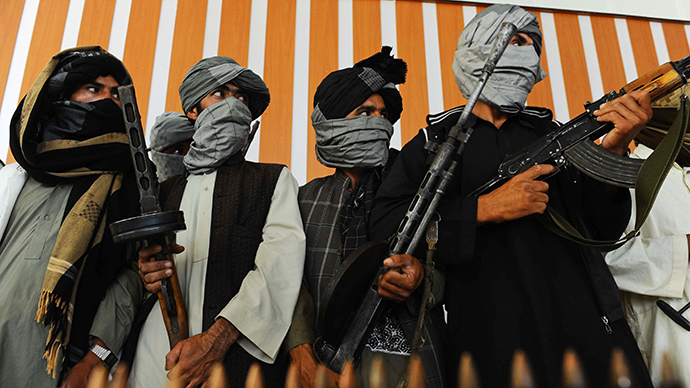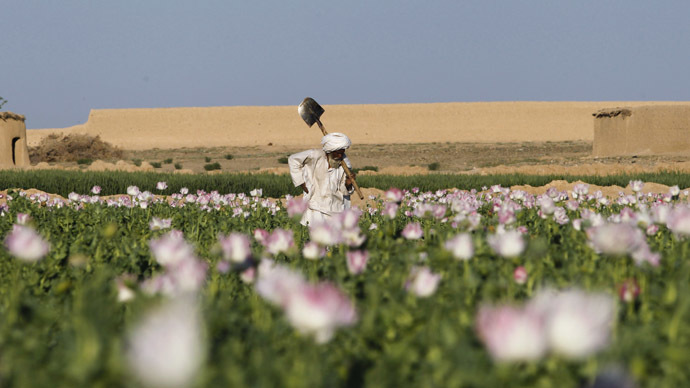‘Afghanistan to experience gradual erosion of the security situation even further’

Afghanistan is in a terrible situation as the Taliban remains strong, and the fact ex-warlords are in the new government of the country is not much better, Phyllis Bennis, Director of the Institute for Policy Studies, told RT.
RT:The US is delaying withdrawal from Afghanistan due to the Taliban making advances. Do you think they can ever make peace in Afghanistan without reaching some kind of a deal with the Taliban? Is it even possible at this point?
Phyllis Bennis: I think there is no possibility of anything remotely resembling peace without negotiations. The US was not able to impose peace when it had 100,000 troops on the ground at one time in Afghanistan with another 45,000 international NATO troops. Now when it has 11,000 troops and about 2,000 international troops it certainly isn’t going to be able to militarily impose anything remotely resembling peace. What we will see is a gradual erosion of the security situation even further. The people in Afghanistan are facing a horrific escalation in violence already and I'm afraid it’s going to get worse. The possibility is going to be there for a negotiated settlement, it’s not a good thing. The Taliban still represents an extremist version of social life that they would impose where they are in control. But of course we have to take into account that the current government of Afghanistan - new President, new Prime Minister are not - is also made up largely of former warlords who themselves share many of those same very misogynistic anti-women and socially very backward, in my view, views on human rights. So when we look at the Taliban it’s a terrible situation, but when we look at the government and in particular the warlords’ presence in the government of Afghanistan, it’s not much better.
READ MORE: ‘More stable & prosperous than ever’? NATO officially ends 13-yr mission to Afghanistan
RT:It’s clear that the Taliban are not going anywhere. Does this mean staying there forever for the US? How many more withdrawal delays can we expect?
PB: I think the US made it very clear that it is not going anywhere any time soon. The extension of the combat role for the remaining troops… There is a lot of playing with words here – these are not the 'combat troops'. Ok, but what will happen if somebody fires on them? Will they shoot back? Of course they will shoot back, that’s self-defense. But when you are in a war zone and you are armed and you are there on one side, it seems to me you are combatants, you can call yourself whatever you want but that’s the role you are playing and the problem with the war is that you don’t get to choose whether you’ll be in a combat role or not. When you are in a war zone and you are armed, and you are operating on one side – you are a combatant. If the other side fires, you will fire back. And when you find it necessary according to your own tactical goals to fire on the other side first, you’ll do that as well.

So the reality is that the US is maintaining occupation troops in Iraq, it’s now about 11,000, how many there will be more than this we don’t know. I do believe that President Obama is very eager not to send in more troops if he can avoid it. This has been his signature act, the initial ending of the war in Iraq and withdrawal of troops in Afghanistan. But he has made very clear that he is not prepared to withdraw altogether, he is still maintaining the position that the military fight must go on. I don’t know if he believes that that’s possible to have a military victory over the Taliban. After 13 years of failure to do just that with far more troops, far more planes, far more bombs and far more Afghan deaths, that couldn’t do it. Does he think he can do it on the cheap now? He is too smart for that. It is not exactly clear what he thinks is possible. But I think every other Afghan watcher knows that the military defeat of the Taliban is simply not going to [happen] any time soon.
RT:You never really hear top US officials talking about the rampant drug production in Afghanistan. But they say they want Afghanistan to be prosperous, secure and corruption free. Can the country be any of those, with such a high volume of drug production?
PB: The reason that people produce drugs is because of the absence of the other alternatives. Under the Taliban the drug production was down, it was enforced. It rose again with the defeat of the Taliban. But the real reason why people produce opium poppies is that it’s possible with a very small amount of machinery to process it very basically into a very small amount of material that has to be transported. When you don’t have roads, don’t have cars and you have huge distances between towns and cities, between the agricultural zone and the city where it has to go, it’s impossible to imagine substituting, say, growing wheat and thinking you can make the same amount of money. How are they going to transport tons and tons of wheat as opposed to a few pounds of raw opium? That’s the reason why people produce drugs. It’s because it’s possible to move it around in a city and country where the infrastructure was almost non-existing and what little there was has been bombed to smithereens in a long-standing war. That’s the reality that has to change before we can think about stopping the drug production in Afghanistan, there has to be an end to the combat that destroys the possibilities of other kinds of economics.
The statements, views and opinions expressed in this column are solely those of the author and do not necessarily represent those of RT.
The statements, views and opinions expressed in this column are solely those of the author and do not necessarily represent those of RT.












